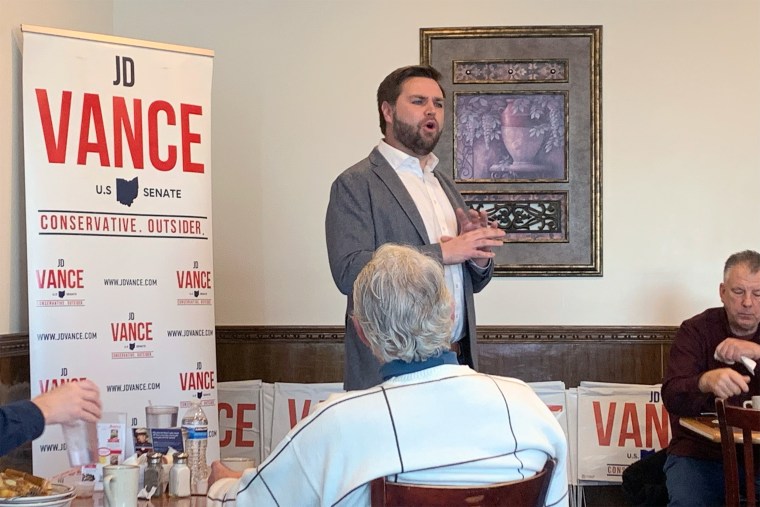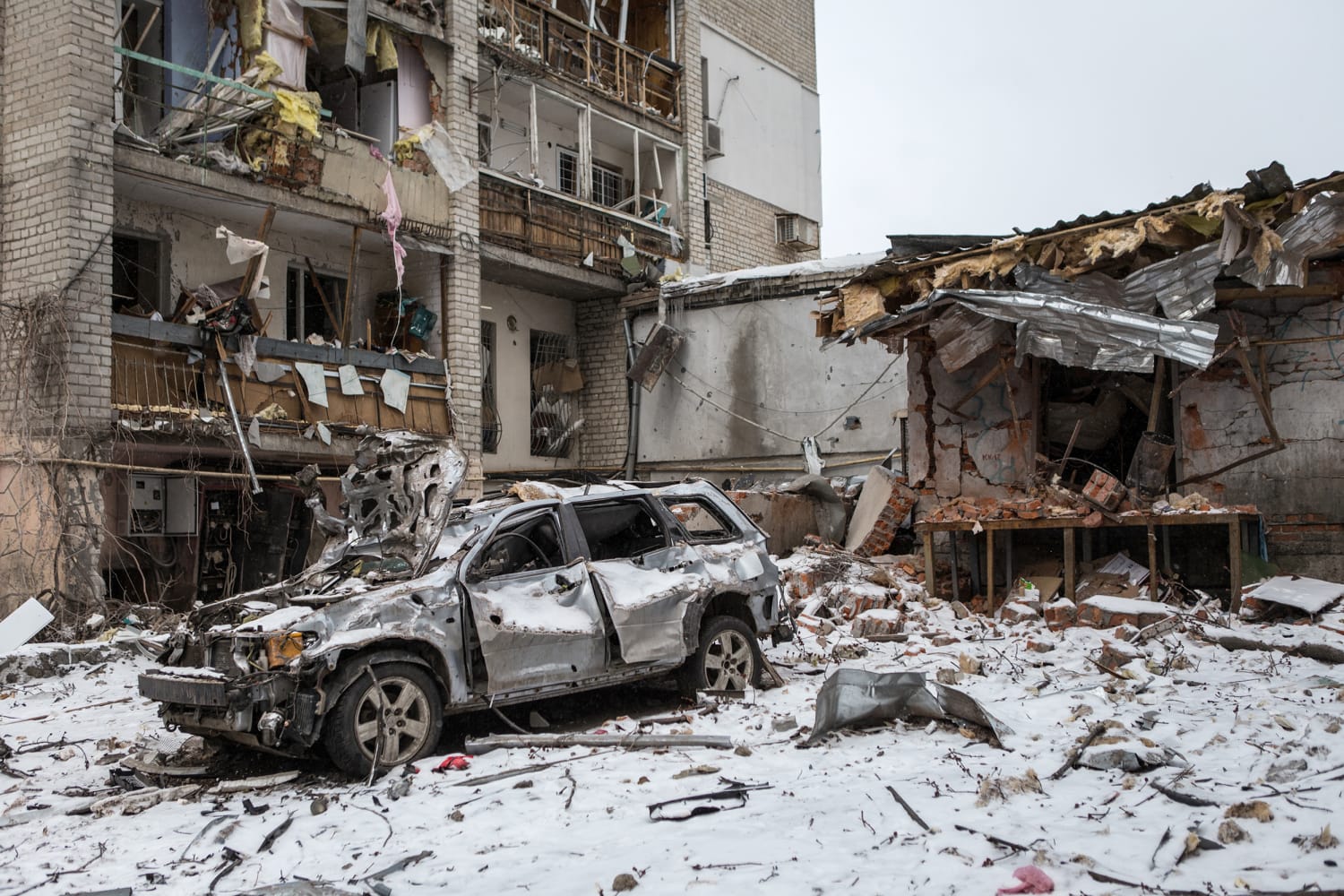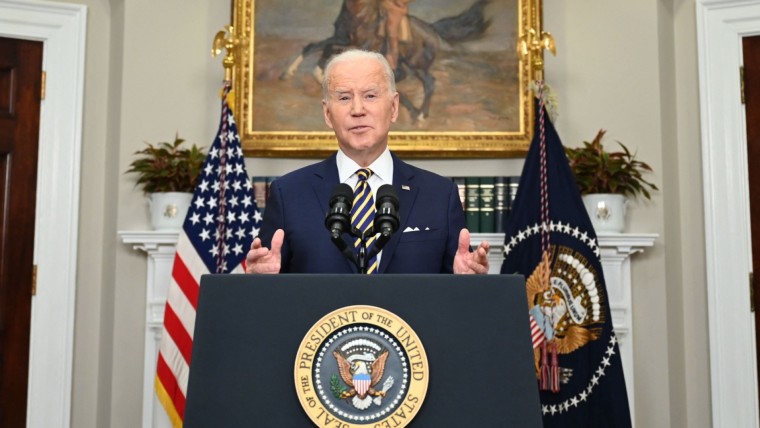STEUBENVILLE, Ohio — Here in the middle of former President Donald Trump’s Midwest base, in a state where a sense of economic malaise lands hard on rural and working-class voters, many Republicans see higher gas prices as a small price to pay to help defend Ukraine.
“I don’t think we’re doing enough,” Mary King, an unemployed caregiver, said of President Joe Biden’s ban on Russian oil last week. She spoke while waiting for GOP Senate candidate J.D. Vance to hold a campaign event in this industrial city along the Ohio River.
“Ask the public what they are willing to sacrifice,” King added. “I pray every day to St. Nicholas to save the children in Ukraine who are in danger.”
The sentiment was much the same upstate in Strongsville, a solidly Republican suburb of Cleveland that has one of the largest Ukrainian populations in Ohio.
“It’s not going to cripple us,” Bob Heinly, a retired cardiac technician, said of the higher gas prices likely to result from the ban, speaking after Vance finished a town hall forum there. “I invest in things that are important to me.”
King and Heinly — among more than a dozen Ohio Republicans interviewed about the U.S. response to Russia’s war against Ukraine — described themselves as loyal Trump voters. Their comments represent a departure from the “America First” mindset that helped Trump easily win the state twice.
A Quinnipiac University survey released last week found broad and bipartisan support among Americans for an oil ban, condemnation of Russian President Vladimir Putin and favorable opinions of Ukrainian President Volodymyr Zelenskyy. On the right wing of the Republican Party, however, there remain influential voices pushing alternate views about the Russian invasion and the U.S. response. Fox News host Tucker Carlson has indulged in conspiracy theories sympathetic to Putin. Rep. Madison Cawthorn, R-N.C., recently called Zelenskyy a “thug.”
Vance — a venture capitalist and author whose memoir “Hillbilly Elegy” established him as someone attuned to economic and cultural grievances in the industrial Midwest and Appalachia — is another notable skeptic about support for Ukraine. Before the invasion, he said he didn’t care what happened in Ukraine.
He has since backtracked some, but Vance continues to express concern that isolating Putin will bring Russia and China closer together. Vance also draws moral equivalencies with the situation at the U.S.-Mexico border, greeting the news that Congress was on track to approve nearly $14 billion in aid for Ukraine with a call for more funding for a border wall.
“We have to focus on our own problems first,” Vance said in an interview here. “I think that message is very strong and it’s not inconsistent with helping the Ukrainians.”
Shannon Burns, president of the Strongsville GOP, a grassroots organization often positioned to the right of Ohio’s Republican establishment, sees problems with the Ukraine-Mexico parallel.
“That is a complicated topic,” Burns said in a telephone interview. “People have a lot of different opinions, and to try to combine the two topics together, I think, is too simplistic.”
GOP voters at two Vance events Thursday wrestled with his positions on the conflict. While they appreciated some of his nuance, many who spoke to NBC News said they formed their opinions after seeing images of death and destruction on TV. Many were also unequivocally supportive of sanctions and the oil ban, expressing a need for empathy and generosity.
“I don’t think there’s anybody in this room who doesn’t watch TV and watch what’s going on in Ukraine,” Heinly said, while questioning Vance at the Strongsville town hall. “It breaks my heart to see this. It’s hard to sit still and not do something. What can we do as individuals?”
Afterward, Heinly said he agreed with Vance’s concerns about Russia forming a stronger, more economically dependent relationship with China, but he also praised Biden.
“I hate to say that Joe Biden and his administration have done anything right, but to a degree I think that this is a smart move, to reinforce the troops in these NATO countries,” Heinly said.

Elsewhere, Dave Johnson, chair of the Columbiana County GOP and owner of a tile company in rural eastern Ohio, has committed to holding 30 jobs for Ukrainian refugees.
“We’re supportive” of the oil ban, Johnson said. “I’m not supportive of starting World War III over this. I think we need to be careful how it’s done, because I think Putin’s half nuts.”
There are pockets of deeper skepticism. In Canton on Thursday night, at a meeting of a local We the People group, one woman confronted another GOP Senate candidate, Mike Gibbons, with conspiracy theories about U.S. involvement in Ukraine.
“I like to look at both sides of the story,” Gibbons, an investment banker, responded. “But I can tell you this, [Putin] went over the line when he attacked a country. So no matter what … he’s beyond the pale, and we have to defend Ukraine.”
Most GOP voters who agreed to be interviewed supported measures that don’t involve troops on the ground or a deeper U.S. military commitment. And no one said they favored a no-fly zone over Ukraine — something that Zelenskyy has asked NATO to impose, but it’s a move that could pull the U.S. and its European allies more directly into the war.
“That will just escalate things,” said Jonathan Helmuth, a window installer and founder of the Canton group, before introducing Gibbons at last week’s meeting.
Voters had criticism for Biden, too, be it a demand that he boost domestic oil production or complaints that the U.S. took too long to aggressively arm Ukrainians to fight for themselves.
“Give them the weapons to be able to defeat the Russian air force — they’re doing a hell of a job,” said Mark Longo, the retired owner of a food service distributor in Steubenville.
Republicans in Ohio and across the Midwest may be resigned to higher gas prices for now — a “wartime cause for the price per barrel,” said Illinois House Minority Leader Jim Durkin. But they also see the issue tying into record inflation, already a top-of-mind concern for voters and something that can make Democrats particularly vulnerable in this year’s midterm elections.
“We’ve got all the oil in the world right here in America,” said Johnson, the tile company owner. “And that’s where I will be critical of Biden. Their solution is, ‘Let’s just all drive electric cars.’”
In Wisconsin, where incumbent Democratic Gov. Tony Evers faces a tough re-election fight, Republicans last week rejected his plan to offer a $150 tax rebate to everyone in the state, regardless of income. Evers, who has also called on Washington lawmakers to freeze the federal gas tax, introduced the idea before the invasion in Ukraine. But his allies believe the GOP has opened itself to criticism by rejecting a plan that would offer some relief.
“There is very little a sitting governor from the Midwest can do to affect the price of gasoline, but he’s being seen as trying to act on it,” said Joe Zepecki, a Milwaukee-based Democratic strategist. “He’s getting caught trying and he knows that’s his job, to reflect what people are caring about. He’s trying to do the right thing, and it’s Republicans who are in the way.”
Other Democrats, however, said the party should be prepared to be held accountable for the issue if prices don’t eventually abate in the coming months.
“It’s going to be far more important to see what these prices look like in six months,” said Ed Rendell, a former governor of Pennsylvania and a Democrat. “If gas prices are still this high, if inflation is still rising, in six months, it will be bad for all Democrats.”
Source: | This article originally belongs to Nbcnews.com












